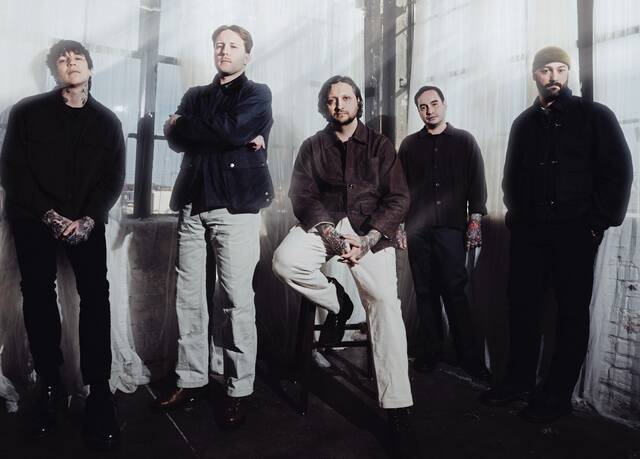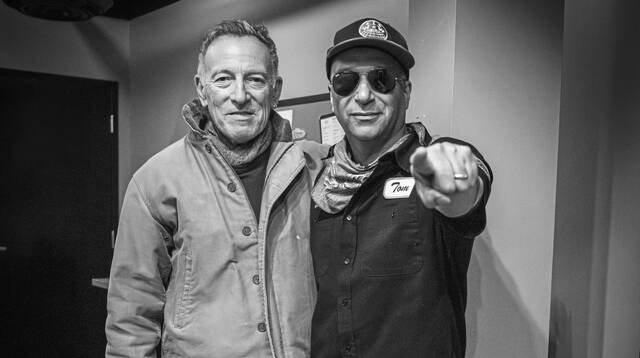Pittsburgh hip-hop artist Mars Jackson has a knack for surprising people.
He performed in art galleries, like Penn Avenue’s Most Wanted Fine Art, when clubs weren’t his style. Threads of soul, jazz and gospel are prominently displayed in his melodic brand of hip-hop music. He openly discusses the benefits of talk therapy and the struggle of never having met his father.
And, he wrote his upcoming album, “Be Better Tomorrow,” from the porch of his North Side home — armed with a journal and a pot of lemon-ginger tea — during off-hours from his 9-to-5 insurance job.
“After work, I’ll just sit and be like, ‘OK, let me get these gremlins out,’ ” he said.
He describes the album, to be released in early 2021, as a diary. It will be his first since 2017.
For my morning people this player playlist is for your! #LookUp ????
— Mars Jackson (@MarSJackSon) September 23, 2020
https://t.co/Dp3rlQBK2k
“I see beauty in a lot of things that I once didn’t see before,” said Jackson. “That’s what I’m trying to teach people in this one, especially this year: We’ve been through a lot.”
Landing on Mars
Surprising those around him is commonplace for the 34-year-old.
Born in New York, Jackson became a Hill District resident around the time he began grade school. He was raised by a single mother with a network of extended family members, all of whom nudged him toward music in different ways.
Jackson’s grandmother introduced him to Aretha Franklin, Diana Ross, Earth, Wind & Fire and classic soul. His mother enlivened household chores with Kirk Franklin, The Mississippi Mass Choir and other gospel favorites. Ignoring her rules, Jackson’s five uncles introduced him to DMX and old-school rap.
Jackson’s all-time favorite video games, “Tony Hawk’s Pro Skater” and “WWE Smackdown vs. Raw,” made Green Day, Limp Bizkit and Jimmy Eat World unexpected additions to his mental playlist, which attracts chiding even now.
“I hear from people all the time, ‘How are you a hip-hop dude, but you’ll tell people you listen to Jimmy Eat World?’ ” Jackson said. “I’m like, ‘Bro, I listen to it all.’ ”
Jackson’s hardworking mother didn’t accept idleness from Jackson or his younger sister.
Church choir, violin lessons and sports were Jackson’s official outlets, though he was also known as an accomplished visual artist. Education was emphasized through high school preparatory programs and visits to the University of Pittsburgh’s Oakland campus.
Despite all the activity, Jackson describes his younger self as shy.
“When I was growing up I would always hear, ‘You’re different, you’re weird,’ ” he said. “As a kid you hear that, you don’t know how to take that.”
By the time he was a student at Pittsburgh’s Schenley High School, no one would call Jackson quiet.
His affinity for rap music took him to a Sam Goody music store when he had a few dollars to spend. Rather than buying the hottest album with full production, he focused solely on instrumental versions of singles — like Usher’s “My Way” — to hone his vocal and rap skills over the accompaniment.
More practice came at track meets, when he’d spit rhymes and entertain teammates between heats.
Jackson attended college on a partial track scholarship, beginning at Thiel College and then transferring to Slippery Rock University. He majored in communications and public relations, and aimed every assignment toward his goal of becoming a professional musician.
He considered the cost of hiring a public relations firm or graphic artists in the future, and used his college time to hone press release writing skills and further dabbled in visual arts. He turned business class assignments into studies on Wiz Khalifa and others, occasionally to the chagrin of his professors.
Jackson graduated from Slippery Rock in 2011 and released his first mixtape, “But Ask Me Do I Care Though” — recorded in a friend’s closet — the same year.
Breaking through
Prior to the popularity of social media platforms such as Instagram and Twitter, Brian Brick, owner of the East End Pittsburgh urban wear store Time Bomb Shop, held an especially influential position in the local hip-hop scene. Brick was not only curator of the store’s wares but also of the music played inside.
With patrons ranging from international hip-hop superstars to local fashion junkies, air time in the sought-after space meant reaching the ears of important would-be fans.
Jackson’s first mixtape “collected dust” at the streetwear hub. In 2013, a Time Bomb employee let Jackson know that his “Coffee Break” tape was being played loud and clear.
“Getting Brick’s approval was definitely one of the biggest moments for me because if he likes it, everyone else has to like it, too — but he wasn’t playing just anything,” said Jackson.
This year, Jackson is making similar strides, though this time it’s due to the melodic variety within his music. Though often categorized as a rapper, Jackson blends musical genres — like gospel, jazz, soul and funk — that might call that label into question.
“When you hear ‘rapper,’ it kinda turns people away sometimes cause they perceive you before they even know what you’re about,” said Jackson. “I just write vibes. I’m whatever you want me to me.”
That blend gives his music an accessibility that has garnered the attention of local, independent radio station WYEP, 91.3FM. “Look Up,” the first single from Jackson’s new album and a collaboration with local vocalist Cam Chambers, was released in May. It caught the ear of Evening Mix host Liz Felix.
“For a station that hasn’t historically played much of that genre and whose audience might not know if they even like it, to be able to hear something like, ‘Oh, there’s a jazz influence on this; there’s soulful singing on this song from Cam Chambers,’ I think it opens it up a little bit to new audiences,” Felix said of the single.
“Look Up” preaches, “Keep shining your light, and you’ll find your way.” It’s a glimpse into Jackson’s daily seat on his North Side porch when he raps, “I’m always in my mind tryin’ to find me.” It shares the strength he finds in his mother’s advice, “Be a leader; be a chief — that’s what I’m embracing.”
“That song kind of hit at the right time as well,” said Felix. “If you listen to the lyrics, he wasn’t writing about the pandemic: He was writing about his personal life, but it makes sense in the present moment.”
Looking up
Lyrics from the title track of Jackson’s 2017 album, “Good Days Never Last Forever,” acknowledge societal and political tensions in America but also preach patience and calm to the Black community.
Jackson, who participated in his first protest a few months ago, has tweaked that view since those words were written.
“I’m patient, but I can’t tell everyone to be patient all the time because it gets to the point where patience doesn’t work,” he said. “I can’t tell anybody how to protest because when people are hurting and they’re tired and you’re telling them, ‘Stop that protest,’ that goes out the door.”
But Jackson, who will be a married man by this time next year, is looking up.
The mental health activist says he’s in a better space mentally, physically, emotionally and spiritually than during the writing phase of his last album. He’s spent time with a therapist and explored deeply protected feelings about his absent father, a person he’s still never met.
Though accustomed to surprising others, Jackson cultivated his own “a-ha moment” since his last album. He’s arrived at a new level of artistic self-confidence, knowing that music is his ready-made therapy.
“That’s why my album is called ‘Be Better Tomorrow’ because we always think about what’s going on today and you dwell on today,” said Jackson. “When you take it into tomorrow, how can you be better? How can you move on from whatever you’re going through?
“That’s the objective for life: You have to be better the next day.”











